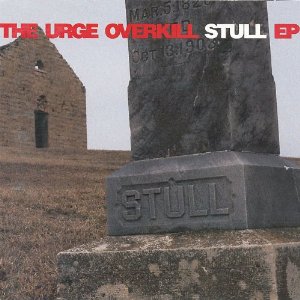
The other gravestone they had photographed, “Wiczenowski,” didn’t have quite the feel they were going for.
Urge Overkill (1992)
Neil Diamond (1967)
Today’s Cover Friday post is the final one in my series of songs written by Neil Diamond and covered with chart success by other groups. And it’s a good thing too, I have to say: as much as I love the early Neil Diamond songs from his Bang Records years, there’s something a little odd about the fact that four of my last eight posts have had to do with Neil Diamond. I mean, come on. (No offense, of course, you Neil Diamond diehards, but you see how I risk whatever street cred I may still have left by doing that, right? I might have to do a week of unreleased Pavement rehearsal tapes just to realign Reselect’s karmic balance of coolness.)
So on to today’s song, “Girl, You’ll Be a Woman Soon.” This one’s a bit different, because when Urge Overkill covered it on their Stull EP in 1992 (famously showing up in Pulp Fiction a couple of years later), they were doing it as a reference to Diamond’s own performance of it, rather than as just a cover of a good song — if you see what I’m getting at. They played it so straight, it was over the top, not shying away at all from the somewhat creepy vibe of the song (the whole “older guy looking forward to a teen girl’s coming of age so that he can legally date her” kind of thing). In a way, by playing it so seriously, it’s a knowing nod to both how great and how creepy the song is. If they’d gotten all goofy about it, it certainly wouldn’t have worked nearly as well.
Nash Kato delivers his lines with a perfect balance of emotional sincerity and leering ickiness…
Well, I finally found
What I’ve been looking for
But if they get the chance,
They’d end it for sure
Sure they would
Baby, I’ve done all I could
It’s up to you
The band plays it crisply, wisely leaving the acoustic guitar intact, resisting the temptation to over-“rockify” the song. In a way, they perfect the song by recognizing its faults and playing to its strengths. Neil Diamond’s 1967 original (from Just for You), while musically excellent, falls short only in that Diamond seemingly didn’t recognize how melodramatically slimy the song could be taken. Like it wasn’t a big deal that he was hanging around the high school (metaphorically, of course — I’m sure he was too busy writing hit songs and making a name for himself to really be doing that) and convincing this girl that they’re meant for each other. But I poke fun at ’60s Neil only because I know that he knows that I love him just the way he is. But ’70s Neil? Or ’80s Neil? They’re on their own.


